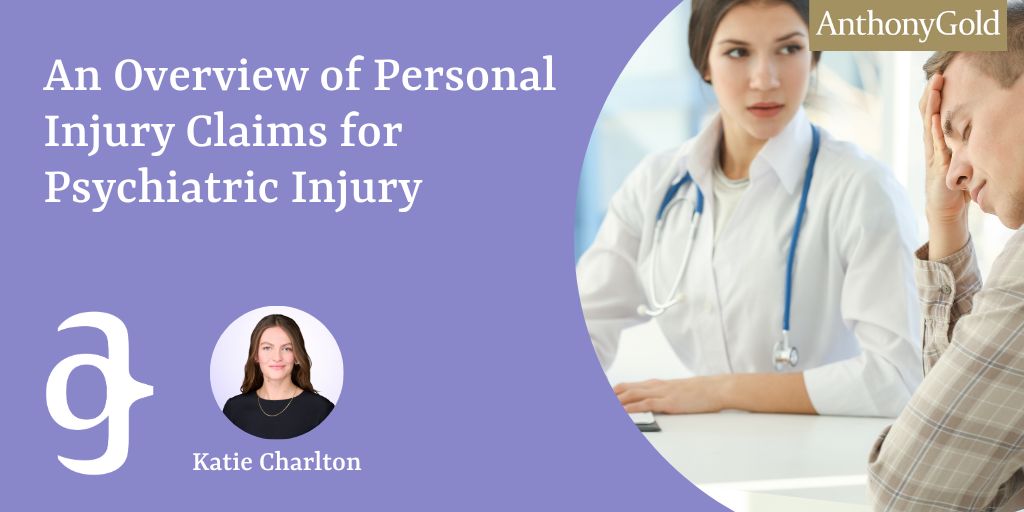An Overview of Personal Injury Claims for Psychiatric Injury

When people think of personal injury claims, they usually imagine physical injuries – broken bones, soft tissue damage, traumatic brain injuries or spinal cord issues. However, personal injury claim can extend beyond physical harm to encompass psychiatric injury which can be just as debilitating and sometimes more so.
What is a psychiatric injury?
Psychiatric injury, often referred to as mental injury or psychological harm, includes conditions such as post traumatic stress disorder (‘PTSD’), anxiety disorders and depression.
Unlike physical injuries, psychiatric injuries can be more challenging to diagnose and prove, leading to greater scepticism by defendant insurance companies. This is however assisted by obtaining evidence from experts such as consultant psychiatrists and clinical psychologists.
The legal landscape surrounding psychiatric injuries is less well known but equally significant. This blog outlines the different types of personal injury claims for psychiatric injury and the circumstances under which they may arise.
1) Individuals who suffer both physical injury and psychiatric injury
Psychiatric injuries are more common than many people realise in standard personal injury claims (such as those arising from accidents at work or road traffic accidents).
For instance, PTSD is often experienced by individuals who suffer physical injuries in traumatic and shocking events. Individuals who suffer a disabling or life changing physical condition from an incident can often also in turn develop clinical depression as a result.
In these circumstances, it is equally important to claim compensation for the psychiatric injury as it is the physical injuries.
2) Individuals who suffer psychiatric injury only as a result of being directly involved in an incident (‘primary victims’)
It is possible for an individual to bring a personal injury claim where they are directly involved in an incident in which physical injury was foreseeable but they in fact only sustain a psychiatric injury.
For example, an individual who is involved in a moderately severe road traffic accident and does not suffer any physical injuries (despite physical injury being foreseeable) but does develop PTSD.
3) Individuals who suffer psychiatric injury only as a result of witnessing an incident (‘secondary victims’)
It may be possible for an individual to bring a personal injury claim where they sustain a psychiatric injury as a result of witnessing an incident they were not directly involved in. Because this could cover such a vast range of people, control measures have been implemented by the courts to avoid a floodgate of claims being opened. In summary, the following conditions must be met to bring a secondary victim claim:
a) It must be reasonably foreseeable that someone could sustain a psychiatric injury;
b) The individual must have a ‘close tie of love and affection’ with someone directly involved in the incident;
c) The individual must witness the incident as it happened or be present at the immediate aftermath of the incident;
d) The individual must witness the incident directly (and not via a TV or radio, for example).
4) Individuals who suffer psychiatric injury as a result of work-related issues (‘stress at work’ or ‘occupational stress’ claims)
It may be possible for an individual to bring a personal injury claim against their employer where they have sustained a psychiatric injury as a result of work-related issues such as stress or bullying. This is a complex area of law. It is beyond the scope of this blog to explore it in detail but two key issues (and common stumbling blocks) in these claims to bear in mind are set out below:
a) The individual must have sustained a recognised psychiatric illness. Stress alone is not sufficient unless and until it deteriorates into a diagnosable psychiatric injury. It is important (and helpful for a potential future claim) for an individual to go to their GP if they start experiencing symptoms beyond stress.
b) It must be reasonably foreseeable to the employer that that particular individual would suffer psychiatric injury (and not just stress) as a result of the work-related issues. This means that the employer should be made aware of not only the issues themselves but also the impact they are having on the individual’s health.
If you or someone you know is dealing with a psychiatric injury as a result of an incident or a work-related issue, seeking expert legal advice can help navigate the complex legal framework, the process of bringing a claim and secure the compensation needed for recovery.
* Disclaimer: The information on the Anthony Gold website is for general information only and reflects the position at the date of publication. It does not constitute legal advice and should not be treated as such. It is provided without any representations or warranties, express or implied.*
No comments